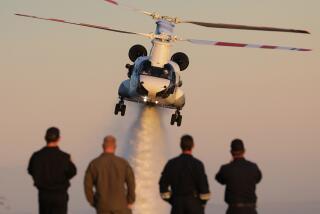EPA vs. farmers? Lawmakers want to ground aerial inspections
WASHINGTON -- The EPA says it does not fly drones over the heartland to spy on farmers.
It does, however, use manned aircraft to enforce anti-pollution laws.
And that’s a practice that a group of farm-state lawmakers want to stop.
Rep. Shelley Moore Capito (R-W.Va.) has introduced the Farmer’s Privacy Act to sharply restrict the Environmental Protection Agency’s use of “aerial surveillance” of farms and ranches -- the latest shot at an agency that congressional Republicans consider a symbol of Washington’s regulatory overreach.
The issue came up during Senate debate Thursday on a farm bill.
“Given EPA’s recent track record with agriculture, if not downright contempt for it, farmers and ranchers simply don’t trust the EPA,” Sen. Mike Johanns (R-Neb.) said during the debate.
Competing measures -- one by Johanns to prohibit the aerial inspections and one by Sen. Barbara Boxer (D-Calif.) to allow for aerial inspections if less costly than ground inspections and if state officials are notified -- failed.
The issue has heated up in recent weeks, with one lawmaker, Rep. Tom Latham (R-Iowa), responding to reports of EPA drones, declaring: “No government agency should be able to treat Iowa farmers like the Taliban.”
EPA contracts for the use of manned aircraft to spot pollution and enforce environmental laws.
“The EPA has used aircraft in enforcement investigations throughout the country to monitor compliance with the agriculture, mining and construction industries, among others,” Cynthia Giles, EPA assistant administrator for enforcement, said in a recent letter to Capito.
Planes can be used to gather evidence, she added.
The criticism has been ridiculed by environmentalists.
“Aerial law enforcement is used to catch speeding cars,” Jon Devine, a Natural Resources Defense Council attorney wrote on the organization’s staff blog. “Isn’t the Clean Water Act as important as a highway speed limit?”
An EPA spokesman said that the aerial inspections can be less costly than ground inspections.
The spokesman cited a 1986 Supreme Court decision that upheld the agency’s authority to take aerial photographs without a warrant of the facilities of a chemical firm suspected of violating clean-air laws. The justices, in a 5-4 decision, turned down contentions by Dow Chemical Co. that EPA’s aerial photography of a 2,000-acre chemical plant complex in Michigan violated its privacy.
ALSO:
Sanford Police Chief Bill Lee fired after Trayvon Martin case
In N.C., compensation for forced sterilization will have to wait
Summer solstice 2012: Did you miss the longest day of the year?
More to Read
Sign up for Essential California
The most important California stories and recommendations in your inbox every morning.
You may occasionally receive promotional content from the Los Angeles Times.











